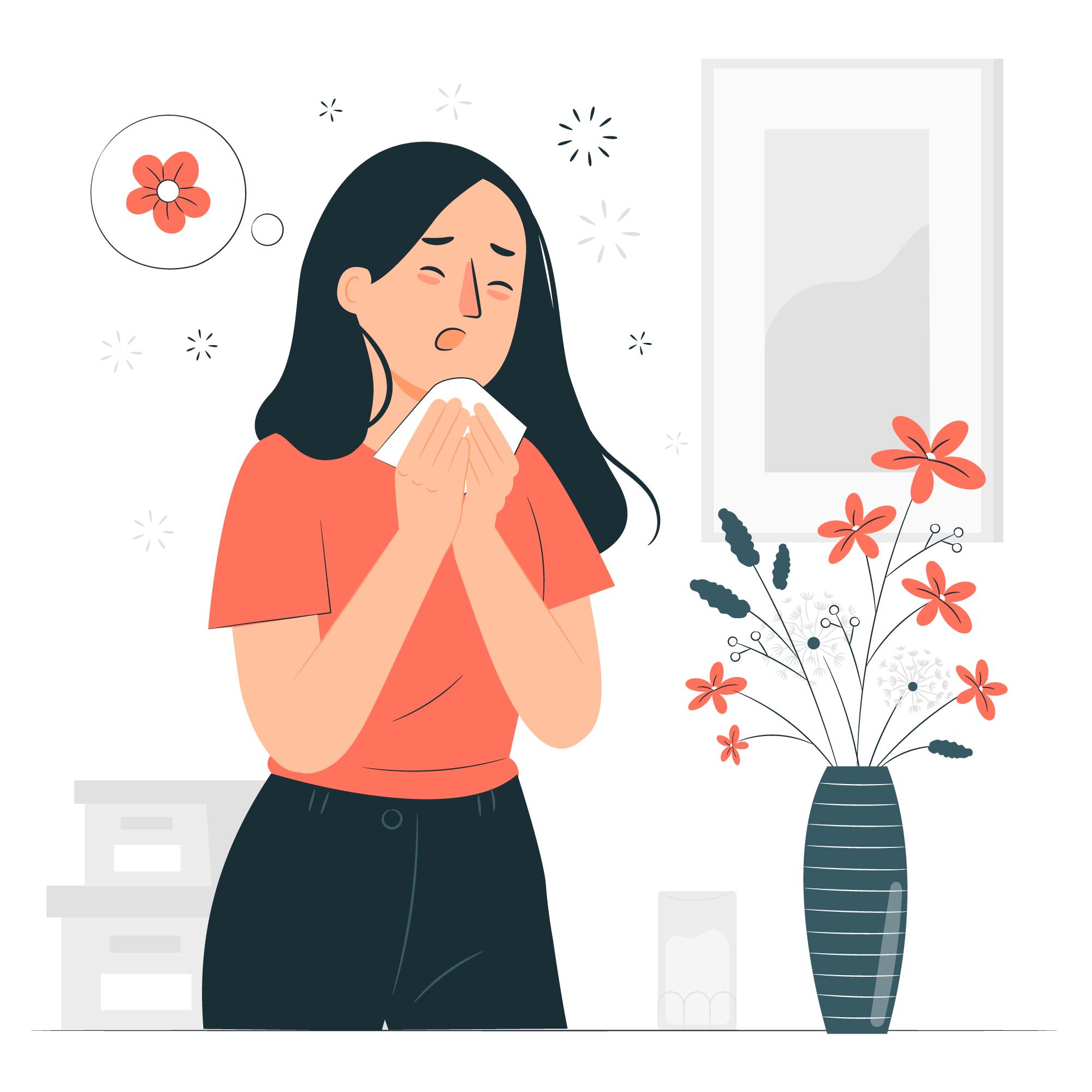Best Nasal Polyps Homeopathic Treatment is to treat Allergic Rhinitis
What is Allergic rhinitis?
Allergic rhinitis is also known as hay fever or nasal allergies. One should not get mislead with the name ‘hay fever’ as neither hay is an allergen, nor it causes any allergy, and fever is not the symptom of the disease. Allergic rhinitis usually presents with symptoms like that of a common cold, like runny nose, congestion, itching in the eyes, sneezing and sinus pressure. Though the symptoms resemble common flu, they are not caused by any virus, but due to allergic reaction to certain outdoor or indoor allergens, like dust, pollens, dust mites, tiny flecks of skin, pet dander and saliva of pets like cats, dogs and other animals.
Allergic rhinitis is caused due to overreaction of the body’s immune system towards any allergen, which may not cause any symptoms in others. Broadly, allergic rhinitis can be of two types-
- Seasonal- It mostly happens in spring, summer, and early fall. They are usually caused due to sensitivity to pollens and airborne mold spores.
- Perennial- People with this type of allergy may have symptoms all year-round, and are usually caused by dust mites, pet dander, cockroaches, or mold.
Causes
Symptoms of allergic rhinitis start as soon as the person is exposed to the substance(allergen) to which he is allergic. The cause may be seasonal or persistent throughout the year, like in perennial allergic rhinitis. The common allergens to which people are often sensitive are the
- pollens,
- mold or fungi,
- pet fur or dander,
- dust mites,
- cigarette smoke,
- and perfume.
The allergens trigger the immune system of the body, which identifies these allergens as some foreign substances and overreacts by forming antibodies against them. These antibodies, in turn, cause the blood vessels to dilate and produce inflammatory chemicals, like histamine. This results in symptoms of allergic rhinitis.
People who have a family history of allergic rhinitis are more likely to develop them.
Sign and symptoms
The sign and symptoms of allergic rhinitis may include-
- Running nose or nasal congestion
- Symptoms of allergic conjunctivitis, like watery, itchy, red eyes
- Sneezing
- Cough
- Itching sensation in the nose, the roof of the mouth or throat
- Swelling and bluish discoloration of the skin, under the eyes
- Postnasal drip
- Fatigue
Risk factors
In most cases, it is difficult to ascertain the exact cause why the person is susceptible to certain things, but there can be several risk factors that may predispose the person to allergic rhinitis like-
- Having other allergies or respiratory medical conditions, like asthma
- Having eczema
- Having nasal polyp
- Genetic predisposition, like having family members suffering from hay fever
- Occupational environment, where the person is constantly exposed to allergens, like pet dander or dust mites
- Risk increases in the mother smoke during the first year of her baby’s life
Complications
Long term problem of allergic rhinitis may get associated with certain complications like-
- Reduced quality of life due to interference in enjoyment of daily activities and reduced productivity at work
- Poor sleep quality
- Worsening of signs and symptoms of asthma
- Increased susceptibility for developing sinusitis
- Hay fever may cause otitis media in children
Diagnosis
For establishing the diagnosis for allergic rhinitis, the doctor will take a detailed medical history of the patient and perform some physical tests, like skin prick test and allergy blood test to diagnose the condition.
Homoeopathic treatment
Homoeopathy treatment for allergic rhinitis is the best choice of medical intervention if one wants a permanent solution for the problem, from roots. Homoeopathic medicines for allergic rhinitis can not only help in managing the presenting symptoms of the disease but also reduce the body’s susceptibility to allergens. Homoeopathic medicines can boost up the immunity of a person and increase resistance towards allergens.
The approach of treatment in most allergic diseases, like allergic rhinitis, is usually done with individualised medicines, which are personally chosen for the patient depending upon his characteristic symptoms. The homoeopathic remedy for allergic rhinitis is chosen personally for the patient, keeping in view his peculiar individual symptoms, which distinguishes the patient, and is specific to that particular patient.
The individualistic approach of medicines includes all the personal aspects of the patient, like his temperament, his likes and dislikes, his hobbies, his disposition, mental and emotional peculiarities, etc with the physical symptoms and characteristics. Medicines chosen on this basis can arouse the inner strength of the person and thus boost up his immunity.
The earlier the condition is diagnosed and as early the treatment is started, the condition will be easy to treat and the prognosis will be better, so parents of children who are diagnosed with allergic rhinitis should try to consult the best homoeopathic doctor for allergic rhinitis as soon as the condition is diagnosed. Because these type of allergies responsible for nasal polyp which can be the worst medical condition for child.
Nasal Polyps Homeopathic Treatment
AVI Homeopathy is one such virtual child homoeopathic clinic that specialises in the treatment of all child-related diseases, including allergic rhinitis. AVI homoeopathy gives access to the best homoeopathic doctor for allergic rhinitis. Dr Ashok Choudhary is a renowned homoeopathic doctor, who specialises in the treatment of all types of children related disorders. Homeopathic medicine works well for children affected by Allergic Rhinitis which cause nasal polyps. Get best allergy and nasal polyps homeopathic treatment. He is the best homoeopathic doctor for allergic rhinitis who has vast experience of 21 years in the treatment of such allergic conditions.




